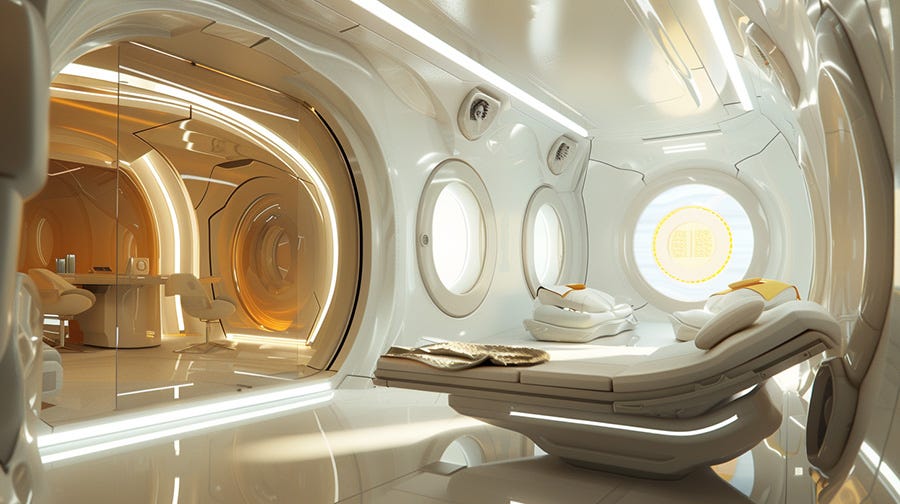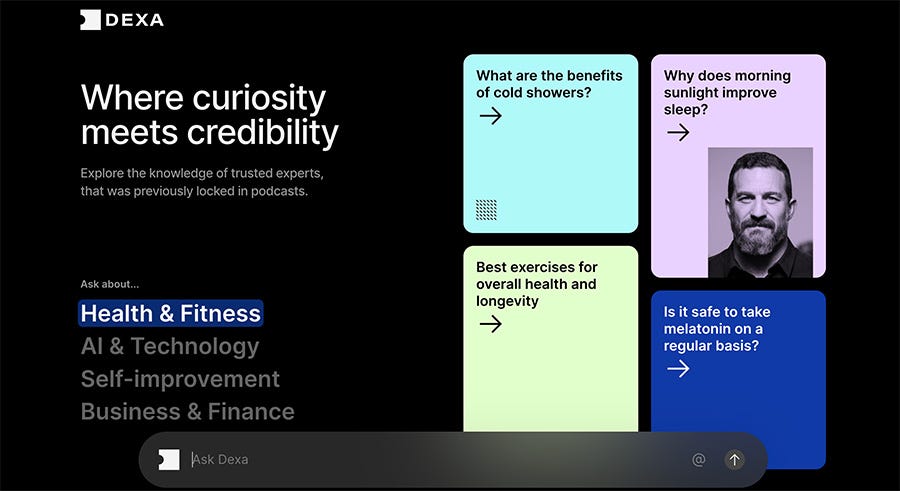Prevention might save your life
We have the knowledge and tools to take control of our healthspan.
In this note, we explore:
Prevention Matters: Health tests that could potentially save your life.
Sequel App: Can't wait to give it a try! It's designed to integrate all your health data and offer personalized insights. How cool is that?
Recommendation: A tool I've been loving lately.
More than ever before, we have the knowledge and tools to take control of our healthspan.
Assess your biomarkers to extend your healthspan
I recommend focusing on prevention for anyone aiming to live longer and healthier lives. As we age, we face risks from four main common aging-related diseases: heart disease, cancer, diabetes, and Alzheimer's. Luckily, there are health tests that can potentially save our lives. Checking these regularly can help detect health risks early and allow us to make lifestyle choices to boost our healthspan and prevent diseases.
These are the tests that might save your life:
1. DNA Sequencing
2. Regular Blood Tests
ApoB Cholesterol Test
HbA1c
3. Coronary calcium scan
4. Cancer screening
5. Colonoscopy
6. DEXA scan
7. Brain imaging
1. DNA sequencing
Understand your genetic and biological risk factors through DNA sequencing.
💡 Your DNA can reveal risks for conditions such as diabetes, heart disease, and hereditary diseases.
🗞️ Whole-genome sequencing is emerging, offering precision scores.
However, with the rise of DNA test companies, it's essential to evaluate their regulations compliance.
DNA Tests that seem compliant: Nebula and Nucleus
2. Regular blood tests
Regular blood tests can help prevent diseases and catch unhealthy trends early, track treatment progress, and assess overall health, providing valuable information for informed healthcare decisions
Regular blood tests - Fitness Insight Blood Test and Basic Metabolic Panel (BMP)
Help monitor biomarkers that affect cardio fitness, metabolism, and overall health
Specific tests - ApoB Cholesterol and the HbA1c
Crucial to detect unhealthy trends early, like assessing heart disease and diabetes risk.
ApoB Cholesterol Test
This LDL cholesterol blood test measures the amount of a certain type of protein of cholesterol called apolipoprotein B-100 (ApoB) in your blood. ApoB protein helps fat get through the walls of arteries forming plaque, which can increase the risk of heart disease & stroke.
HbA1c blood test
It measures average blood sugar levels over the past 3 months. High levels indicate a risk for diabetes.
Specific tests - Proteomics
Advanced blood analysis techniques, such as proteomics, offer comprehensive insights into a patient's health by measuring numerous proteins simultaneously, aiding in early disease detection and treatment monitoring
3. Coronary calcium scan
This ultrasound of the carotid arteries helps assess the risk of coronary artery disease (CAD) and future cardiovascular events by checking for plaque buildup in neck arteries, which increases stroke and heart attack risk.
4. Cancer screening
Regular screenings can help identify cancer before symptoms appear, increasing the chances of successful treatment and potentially saving lives.
💡 Cancer results in 1 in 6 deaths globally & one of the largest health problems in the world.
Promising advancements include:
- The latest TruDiagnostic partnership with Precision Epigenomics introducing EPISEEK™ a multi-screening cancer liquid biopsy that by looking at trends in molecular patterns that form on our DNA (epigenetic markers) can screen for Prostate, Rectal, Bladder, Breast, Colon, Esophageal, Head & Neck, Pancreas, Lung Squamous Cell Carcinoma, and Lung Adenocarcinoma cancers-
- The Galleri blood test. Using advanced sequencing technology, it detects cancer-related DNA changes early on, enabling early detection of various types of cancer.
However, it's currently available only in the US and undergoing clinical trials in the UK. Let's hope it becomes available in Europe soon!
📢 If you know of any other alternatives in the EU, please share.
5. Colonoscopy
Recommended every 5-10 years starting at age 35-50. Colonoscopies detect and remove colon polyps before they become cancerous, reducing the risk of colorectal cancer.
💡 Colon cancer is the second leading cause of cancer-related deaths worldwide.
A colonoscopy can detect colorectal cancer early when treatment is most effective.
It can also diagnose gastrointestinal conditions like IBS & gastrointestinal bleeding.
🥦 Adopting a diet low in sugar and processed meat while high in fiber can further reduce risks.
6. DEXA Scan
This test does several things:
💡 It's the most accurate way to test your body fat levels.
It measures visceral fat, the fat around your organs.
It measures how strong your bones are.
It assesses your risk of metabolic disease & osteoporosis.
7. Brain imaging
This test uses an MRI to help detect structural abnormalities & can help diagnose the potential for neurological conditions like Alzheimer's, dementia, tumors & strokes.
Resources:
Sequel - Your personal AI longevity assistant
I'm excited to try this newly released app called Sequel.
Created by @farbood, a biohacker making waves in the X community. He has been biohacking for 25 years, and recently, became one of the first 200 people in the world to receive Follistatin gene therapy at the Mini Circle clinic in the new Próspera City of Roatan, Honduras
Sequel is a longevity assistant for interacting with your health data (whoop data, supplements, lab reports, scans etc)
It's open-source: You can customize it, check out the code, and see the prompts used to analyze the data.
It is locally stored: Your data stays yours; Sequel doesn't access or view it. You can run it locally or with OpenAI.
You can chat with your complete health picture: from blood tests to Whoop data, DEXA scans, and even the therapies or supplements you're taking.
It keeps track of the data: no need to re-input everything every time you need to ask something; Sequel keeps track of your data for seamless access.
Although still in its early stages, Sequel looks incredibly promising.
Will you join me in giving it a try?
Download it at: withsequel.com
LAST BUT NOT LEAST...
My latest tool pick
dexa.ai
It is a platform that provides access to the knowledge of experts, shared in podcasts. I use it to answer specific questions about health and longevity. I like that it directly links answers to experts, ensuring transparency and credibility. One of my favorite features is the question suggestion feature, which, much like Perplexity, encourages deeper exploration.




